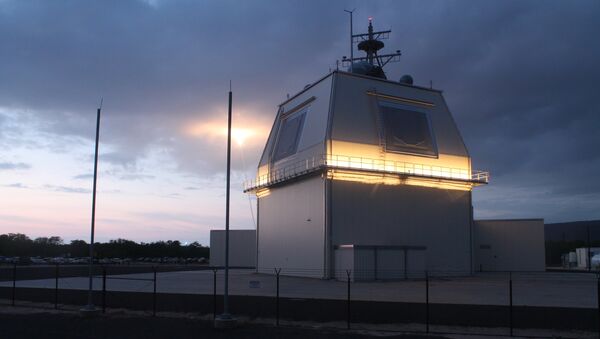NATO military officials are examining the possibility of upgrading existing anti-missile systems in Eastern Europe to target Russian ballistic and cruise missiles, officials have told the New York Times.
The deliberations, coming on the heels of President Trump's move to scrap the 1987 Intermediate-Range Nuclear Forces (INF) Treaty in February, were acknowledged as provocative, with Jim Townsend, a former deputy assistant secretary of defence for European and NATO policy, saying that such a step would mark "a real escalation" in NATO-Moscow tensions and become a "point of no return with the Russians."
Anonymous current and former officials speaking to the newspaper said that the US Missile Defence Agency has already studied the potential to upgrade its existing Aegis Ashore systems with new radar, software and interceptor systems to enable them to intercept modern Russian ballistic and cruise missiles. The system in Romania has already been undergoing an upgrade, although officials assured NYT that this was planned in advance and not related to the current tensions over the INF.
Signed in the waning days of the Cold War between US President Ronald Reagan and Soviet General Secretary Mikhail Gorbachev, the INF banned the development, deployment and testing of ground-based missiles in the 500-5,500 km range, and was aimed primarily at reducing the risk of nuclear war in Europe. The treaty is set to be terminated on August 2.
Officials clarified that the talks about new missile defence capabilities in Eastern Europe were 'at their earliest stages', with a NATO spokesperson denying that any feasibility studies on upgrading the systems were taking place.
On Friday, NATO Secretary General Jens Stoltenberg said NATO would respond "in a defensive way" if Russia does not "come back into compliance" with the INF, repeating Washington's claims about Russia's alleged violation of the treaty. Moscow has flatly denied the claims, briefed media and NATO officials on its ground-based missiles' capabilities, and accused the US of potentially violating the treaty itself with its Romanian and Polish ABM deployments, which Russia says could be easily converted for offensive purposes.
"When it comes to the ballistic missile defence, it is not directed against Russia," Stoltenberg said during Friday's briefing. "It is not capable of shooting down Russian intercontinental ballistic missiles. So this is a system which is directed against threats from outside the Euro-Atlantic area and that's still the case."
However, in a briefing last week, Stoltenberg said NATO was considering the creation of new air and missile defence capabilities, without elaborating.
On Friday, Russian Federation Council deputy chairman Vladimir Dzhabarov warned that Russia would mirror any deployment of mid-range and short-range missiles by NATO in Europe. The same day, officials from Russia's permanent mission to the alliance said Moscow would not develop or install such missiles in Europe even after INF expired so long as the US did not do so.
Last week, Russian President Vladimir Putin said the US's withdrawal from the Anti-Ballistic Missile Treaty in 2002 and President Trump's move to scrap the INF in February had put the world at risk of a new arms race, with Russian diplomacy now focused on trying to save the Strategic Arms Reduction Treaty (New START), another major nuclear treaty set to expire in 2021 unless it is renewed.

